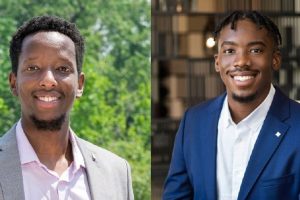
A team led by two PhD candidates in the Department of Chemical and Biomolecular Engineering won the cohort prize at FastForward U’s Fuel Demo Day, held in early December.
Drūl, started by Brent Ifemembi and Nelson Ndahiro, was one of nine student teams invited to participate out of over 40 teams that applied. The team’s device collects saliva, isolates harmful bacteria, and quantifies bacterial concentration to identify the early onset of oral disease. Fuel is a semester long accelerator to equip Johns Hopkins University student startups for success. The team won the $3,000 cohort prize in addition to a $5,000 participation stipend. Recently Drūl was named one of Baltimore’s 20 fastest-rising tech companies by Technical.ly.
“The Fuel Accelerator allowed us to connect with and learn from some of the brightest and most creative student-entrepreneurs at Hopkins,” Ndahiro said after the event. “During the accelerator we learned valuable lessons on how to adjust our pitch to capture an audience’s attention while clearly communicating the value proposition that our company was providing. This imbued us with a confidence to adapt and to be able to talk to anyone about our company.” The prize money will be used to acquire more samples and improve accuracy in detecting diseases, Ndahiro said.
Ifemembi and Ndahiro are both teaching assistants for the ChemBE senior product design class. Ifemembi was a two-term treasurer on the Graduate Student Liaison Committee, is involved with the Vivien Thomas Scholar Initiative as a VTSI Fellow, and was a former chair of the Black Graduate Student Association. He describes himself as passionate about increasing the number of underrepresented graduate students on campus. Ndahiro was the social chair of the Graduate Student Liaison Committee, where he planned social events before and during the COVID-19 pandemic, and is on the executive board of the university’s African Business Club, where he coordinates events to promote the building of bridges between Africa and its American diaspora. He also trains talented underrepresented high school students in the Baltimore area in scientific research skills for seven weeks each summer.
The team answered some questions via e-mail about this project and future endeavors.
How did you arrive at the issue of dental health?
Ifemembi: We both had a passion for how we can use our skills, which happened to be in biotech and bioengineering, to improve everyday life. As we researched different healthcare sectors, we found that oral health was often overlooked and seemed to suffer on multiple fronts. First, since most people only assess their oral health once or twice a year, diseases were highly undiagnosed leading to expensive interventions and dental anxiety. Secondly, the molecular basis of various oral diseases had not been translated into the clinical setting at all. We saw this as an opportunity to provide more information about people’s oral health and recommend personalized preventative tools to improve their health at-home. Surprisingly, lack of access to preventative measures increases oral treatment costs by over $4 billion annually. Also, personally, we have both had very negative experiences with our oral health (as many people do) and we were hoping to improve the status quo. When we realized how big of a problem it was, we dived in.
Have you gotten any feedback or advice from outside the JHU community? From dental or medical professionals?
Ndahiro: Yes! As we were investigating the scale of the problem, we interviewed many stakeholders which included patients, people afraid of the dentist, and practicing dental professionals. Patients we interviewed shared stories on the difficult situations they faced in receiving oral care. Specifically, one family told us of a time when they had to pay unexpected fees of more than $1000 in a single visit due to unforeseen dental decay. Another person we interviewed, who skipped the dentist for years, shared that they were shocked to learn of how rapidly their oral health had degraded. They ultimately had to replace all their teeth with dentures when they could not afford a costly tooth restoration procedure. We also spoke with dentists who expressed interest in updating the tools available to understand the oral cavity and microbiome. Many were excited about our progress and have expressed interest in partnerships. We have also received lots of feedbacks from professors, industry leaders, and venture capitalist during the various pitch competitions and accelerators we have participated in.
Do you have a plan or idea of what you’re going to do after JHU?
Ifemembi: We both plan to continue with Drūl full-time once we graduate. We are planning to raise enough funds for us to complete our prototype and expand our team.